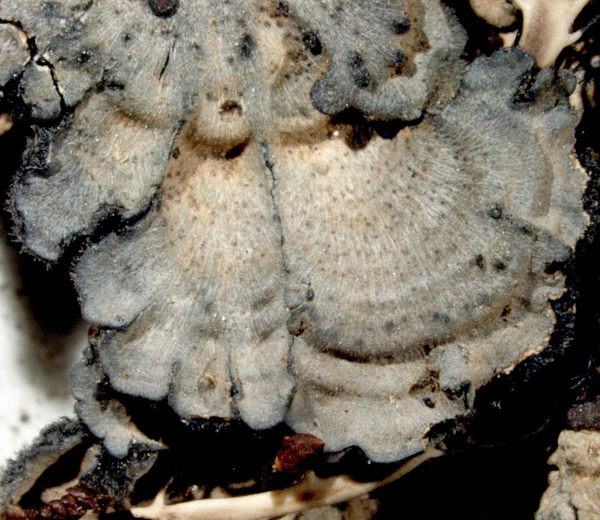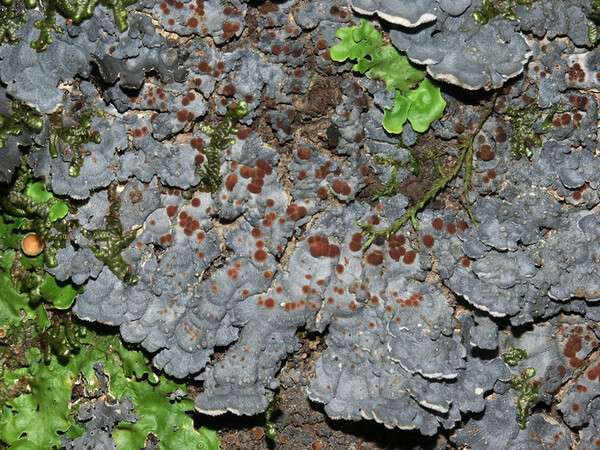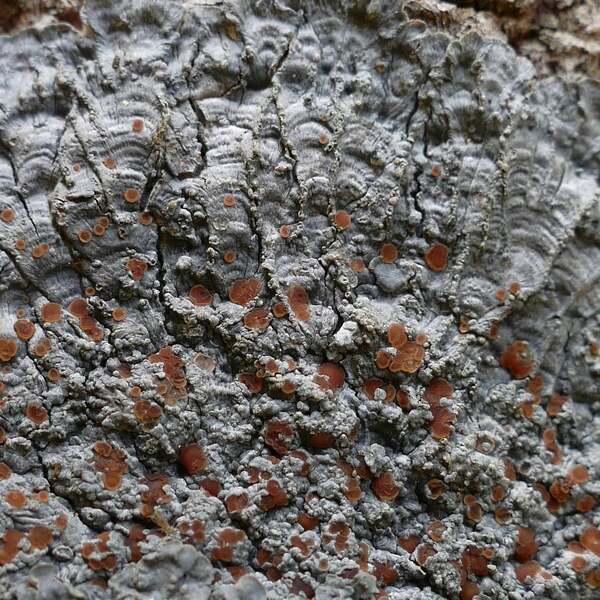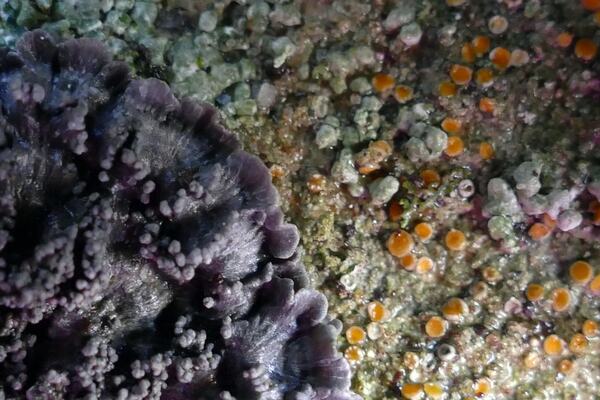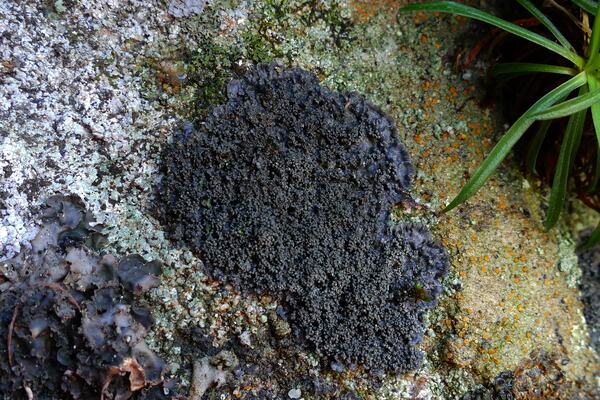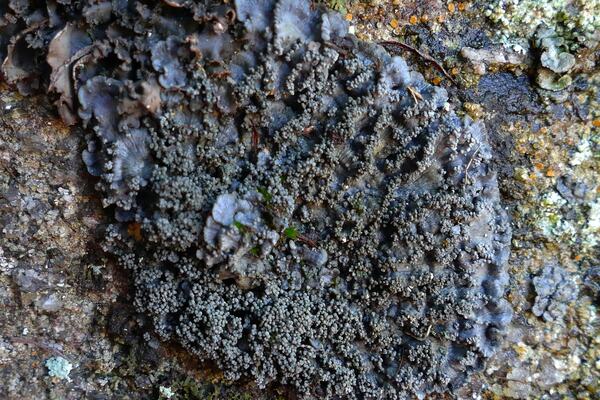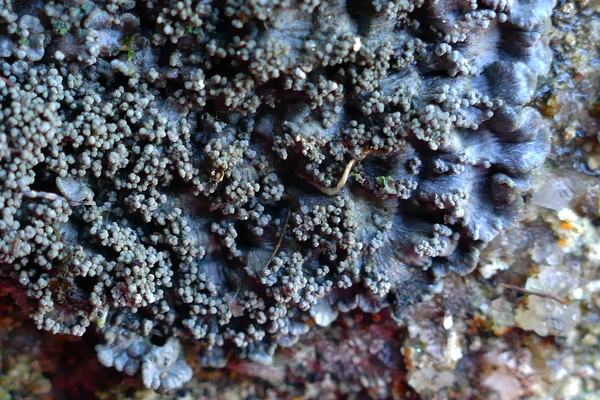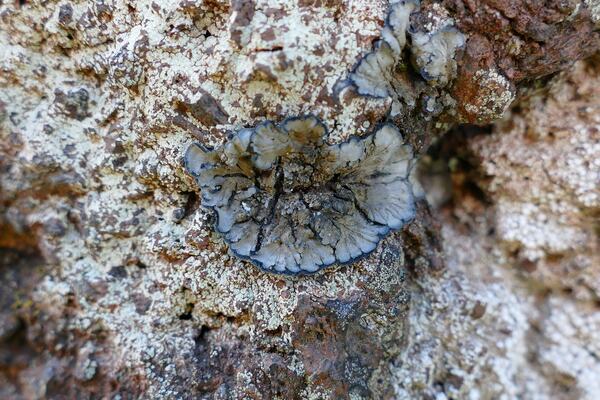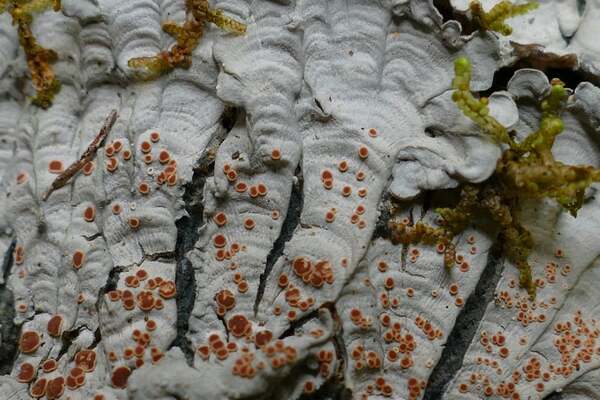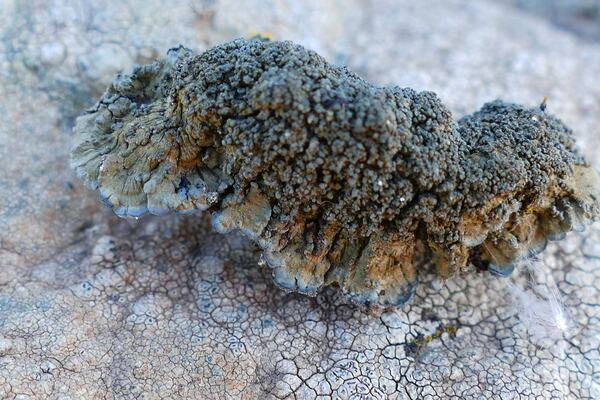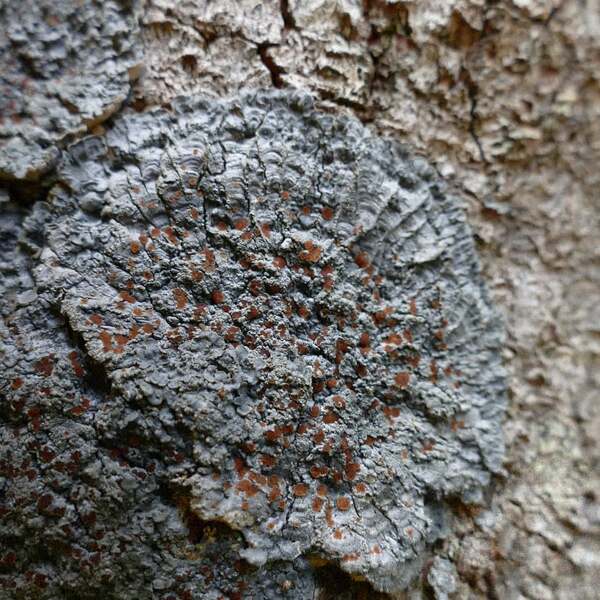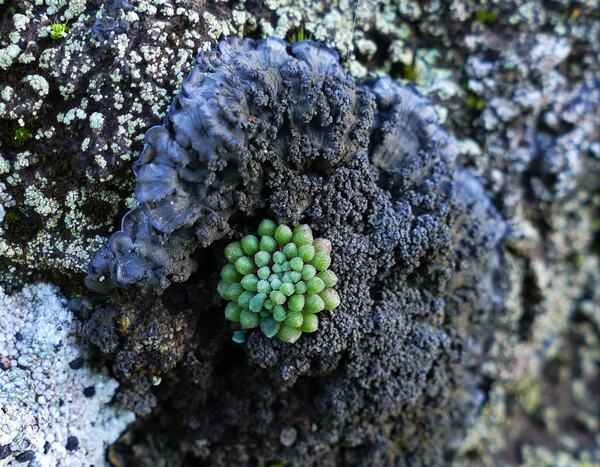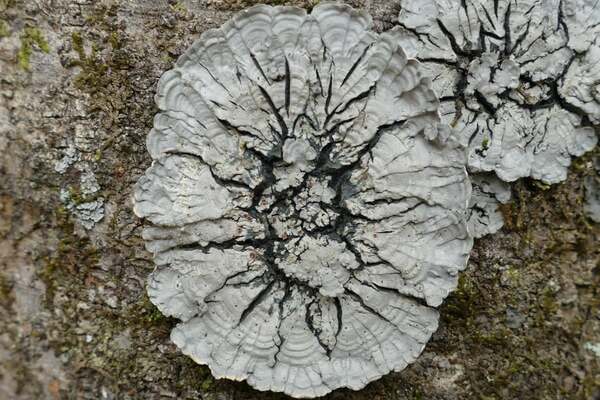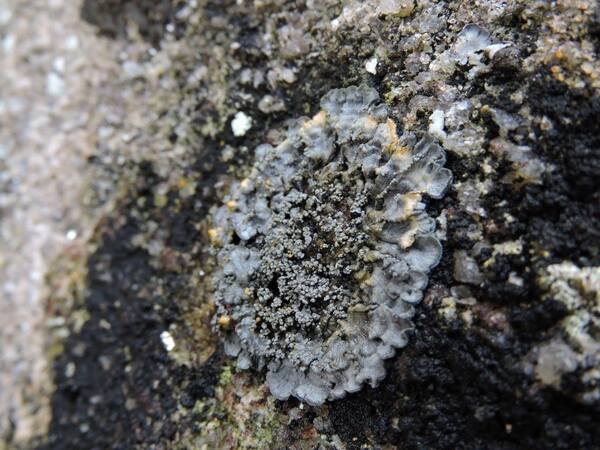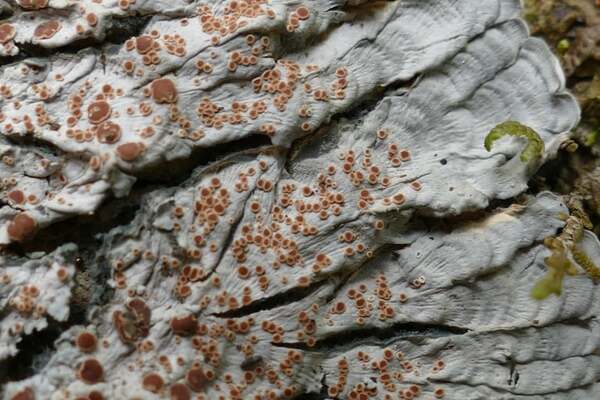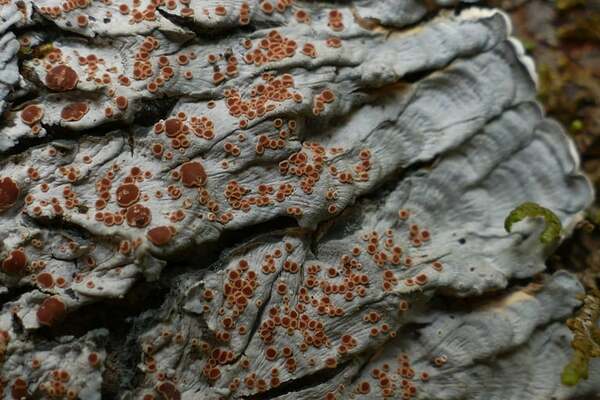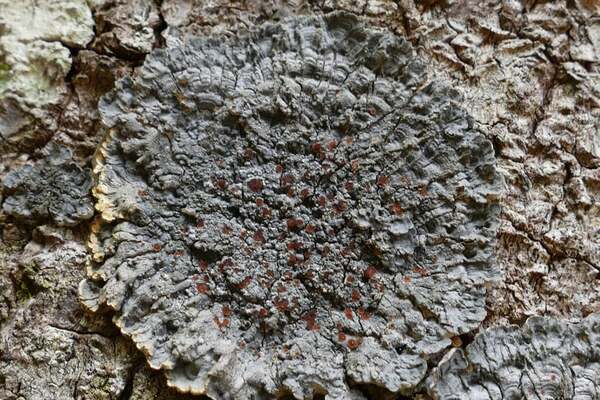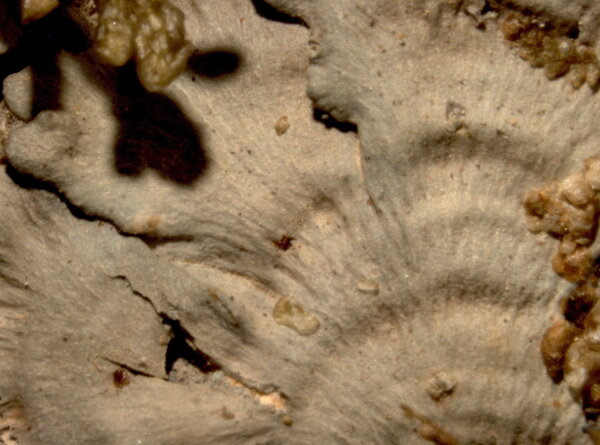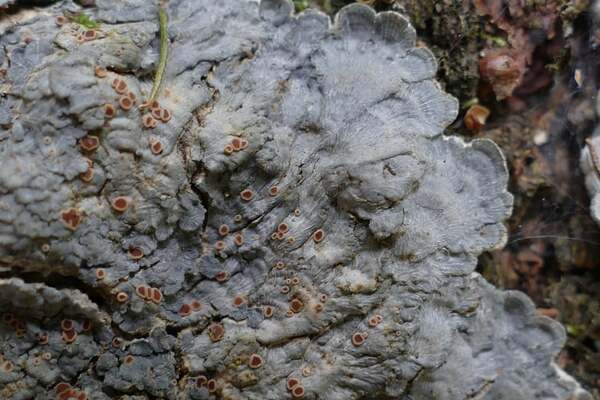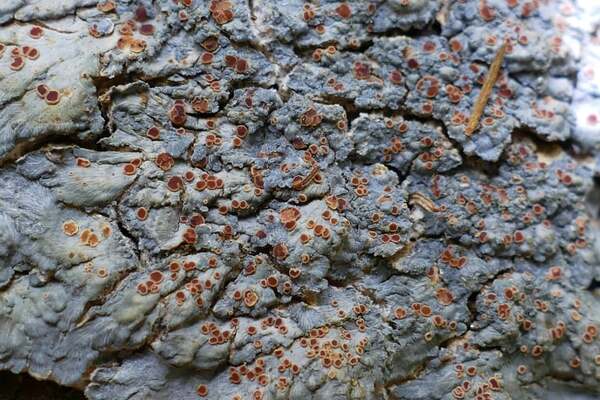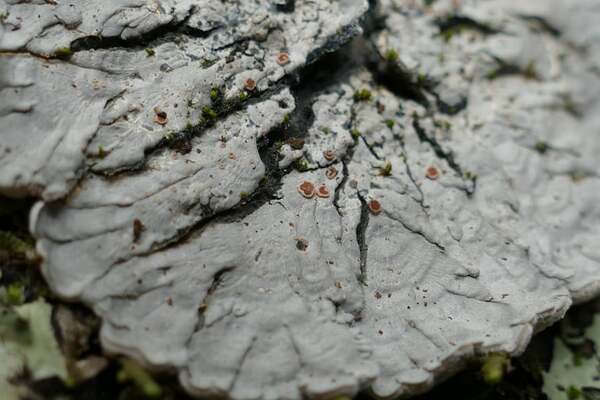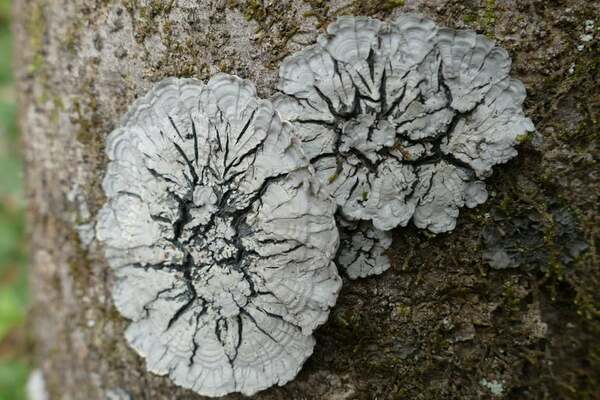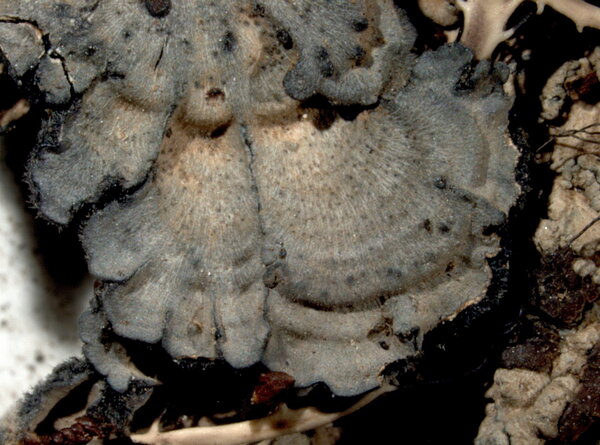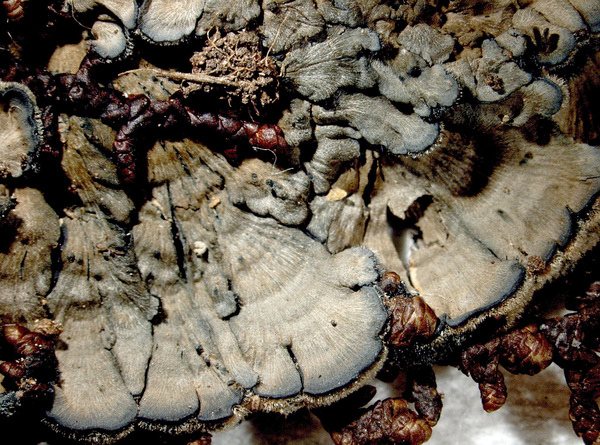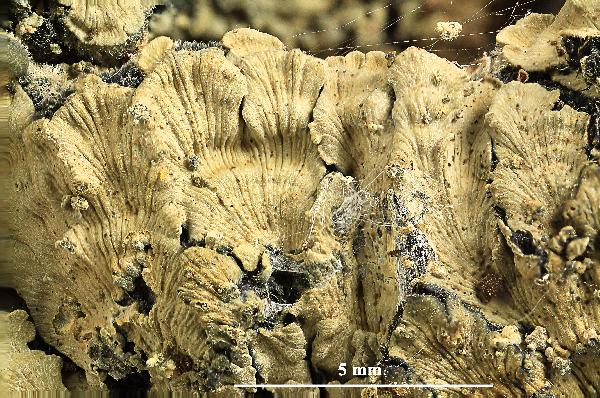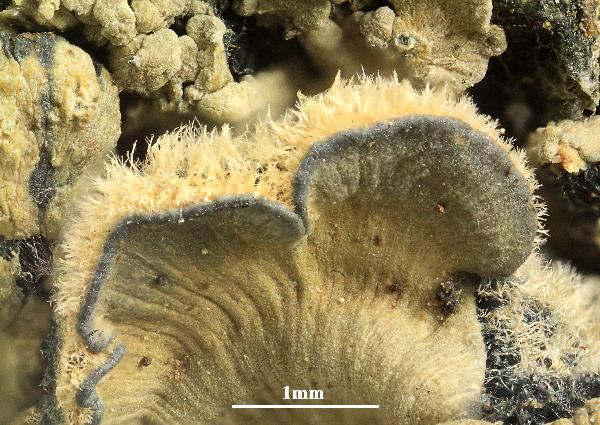Pectenia atlantica (Degel.) P.M. Jørg., L. Lindblom, Wedin & S. Ekman
in Ekman & al., Lichenologist, 46: 652, 2014. Basionym: Parmeliella atlantica Degel. - Acta Phytogeogr. Suec., 7: 131, 1935.
Synonyms: Degelia atlantica (Degel.) P.M. Jørg. & P. James
Distribution: C - Sar (Di Nuzzo & al. 2022). S - Bas (Bartoli & Puntillo 1996, 1998, Potenza 2006, Potenza & Fascetti 2012), Cal (CLU).
Description: Thallus foliose, rather firmly attached, monophyllous in central parts, distinctly lobed at margins, forming up to 6 cm wide, orbicular rosettes delimited by a fibrous, pale to blue-black prothallus, the surface with knob-like to subcoralloid, up to 0.2 mm thick isidia that often cover the whole thallus. Lobes contiguous, fan-shaped, rounded at apices, (1.5-)2-4(-5) mm wide, concave, with successive trough-shaped segments, each ending in a transverse, crescent-shaped structure, the surface finely to strongly longitudinally striate, lead-grey to bluish grey, sometimes with a brownish hue, paler at margins and apex. Lower surface with a prominent, blue-black hypothallus of rhizohyphae, sometimes extending beyond the margins. Upper cortex paraplectenchymatous, not sharply delimited from photobiont layer; medulla dense, white to pale brown, of parallel, horizontally oriented hyphae; lower cortex poorly developed or absent. Apothecia very rare, biatorine, adnate, 0.5-1 mm across, with a flat, reddish brown to finally blackish disc and a distinct, concolorous or paler proper margin. Proper exciple of radiating, isodiametrical cells; epithecium pale yellowish brown; hymenium colourless, K/I+ blue; paraphyses mostly simple, not swollen at apices; hypothecium yellowish. Asci 8-spored, slightly clavate, the upper half K/I+ blue in two parallel layers, with a K/I- layer inbetween. Ascospores 1-celled, hyaline, ellipsoid, without perispore, (14)17-20(-23) x 7-9(-12) μm. Photobiont cyanobacterial, (Nostoc, the cells in clusters). Spot tests: cortex and medulla K-, C-, KC-, P-, UV-. Chemistry: without lichen substances.Note: a mild-temperate lichen, mainly western in Europe, found on trunks, more rarely on mossy rocks, in moist-warm stands. Its presence in Italy is very dubious: there are several records from the Tyrrhenian part of the Peninsula, but these could be due to confusion with isidiate forms of P. plumbea (see Otálora & al. 2017). All Italian samples in TSB, on which previous records from Venezia Giulia, Tuscany, Campania, Calabria and Sicily were based (see Nimis 2016), proved to belong to P. plumbea. The many samples from Calabria in CLU,as the records from Basilicata and Sardinia, need to be critically re-examined.
Growth form: Foliose, narrow lobed
Substrata: bark
Photobiont: cyanobacteria, filamentous (e.g. Nostoc, Scytonema)
Reproductive strategy: mainly asexual, by isidia, or isidia-like structures (e.g. schizidia)
Restricted to humid-warm, oceanic areas
Poorly known taxon in need of further study
Commonnes-rarity: (info)
Alpine belt: absent
Subalpine belt: absent
Oromediterranean belt: absent
Montane belt: extremely rare
Submediterranean belt: absent
Padanian area: absent
Humid submediterranean belt: extremely rare
Humid mediterranean belt: extremely rare
Dry mediterranean belt: absent
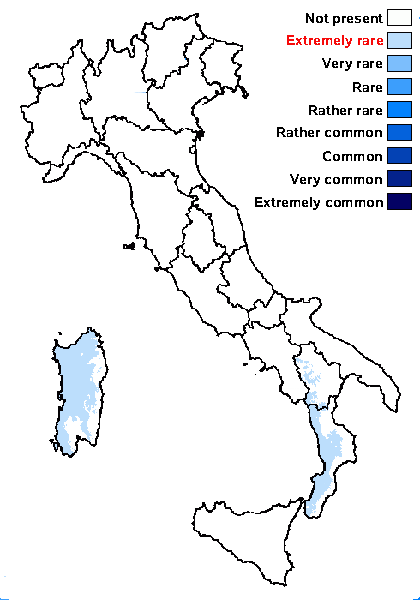
Predictive model
Herbarium samples
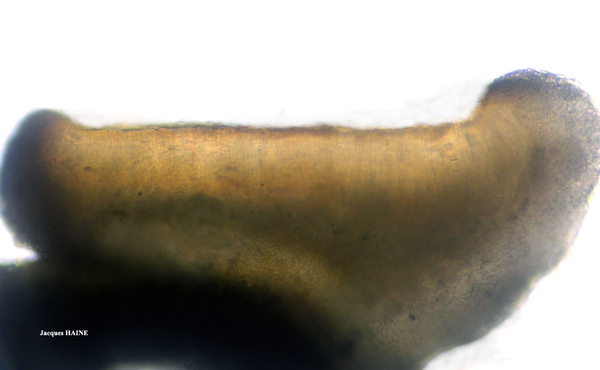
Jacques Haines - Source: http://www.lichensmaritimes.org/index.php?task=fiche&lichen=403&lang=en
Spain, Canary Islands, Santa Cruz de Tenerife
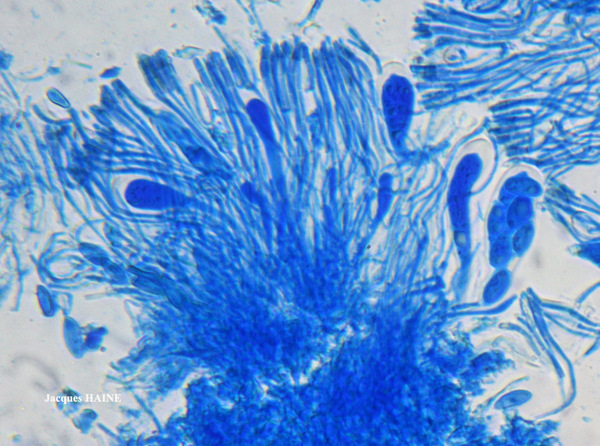
Jacques Haines - Source: http://www.lichensmaritimes.org/index.php?task=fiche&lichen=403&lang=en
Spain, Canary Islands, Santa Cruz de Tenerife
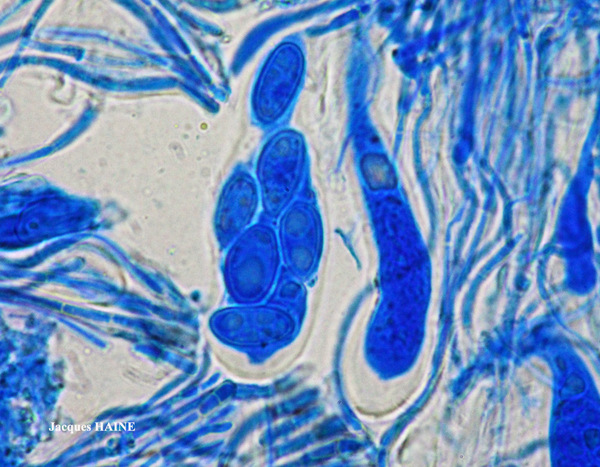
Jacques Haines - Source: http://www.lichensmaritimes.org/index.php?task=fiche&lichen=403&lang=en
Spain, Canary Islands, Santa Cruz de Tenerife
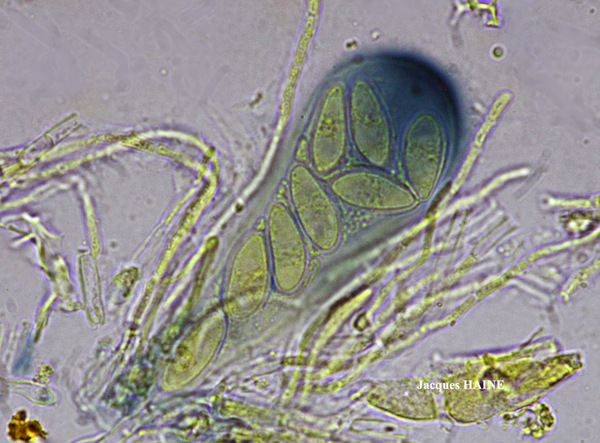
Jacques Haines - Source: http://www.lichensmaritimes.org/index.php?task=fiche&lichen=403&lang=en
Spain, Canary Islands, Santa Cruz de Tenerife
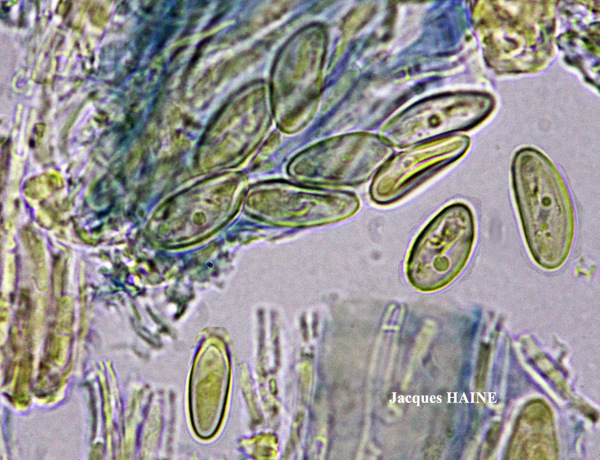
Jacques Haines - Source: http://www.lichensmaritimes.org/index.php?task=fiche&lichen=403&lang=en
Spain, Canary Islands, Santa Cruz de Tenerife
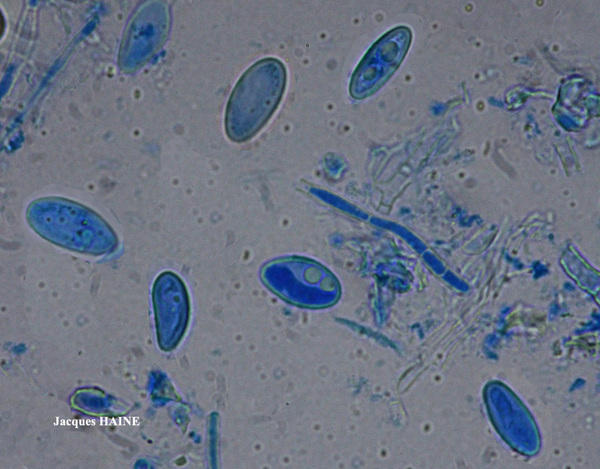
Jacques Haines - Source: http://www.lichensmaritimes.org/index.php?task=fiche&lichen=403&lang=en
Spain, Canary Islands, Santa Cruz de Tenerife
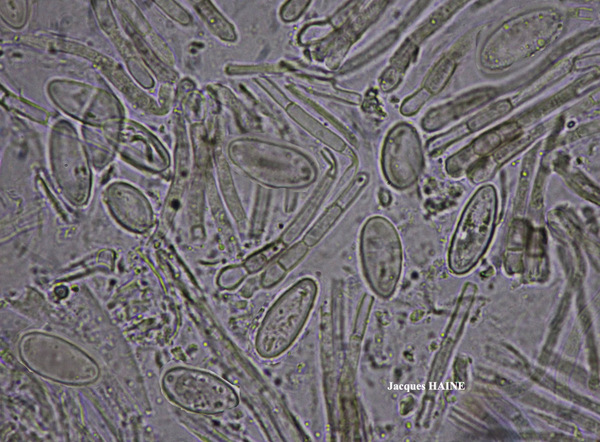
Jacques Haines - Source: http://www.lichensmaritimes.org/index.php?task=fiche&lichen=403&lang=en
Spain, Canary Islands, Santa Cruz de Tenerife
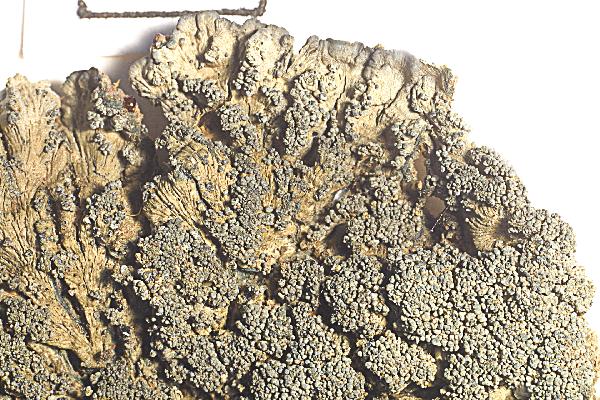

Felix Schumm - CC BY-SA 4.0
[2471], Spanien, Kanarische Inseln, Teneriffa, Mercedeswald bei Cruz
del Carman, Erica-Myrica-Wald, an Lava, 750 m. Leg. F. Schumm,
21.03.1978, det. F. Schumm 1978 - Verglichen mit Proben aus dem
Herbar G.Follmann.
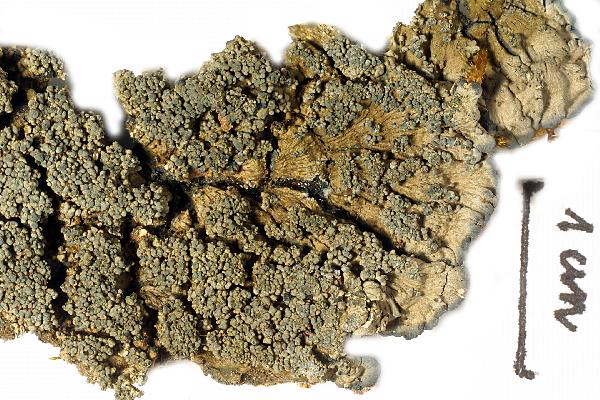

Felix Schumm - CC BY-SA 4.0
[2471], Spanien, Kanarische Inseln, Teneriffa, Mercedeswald bei Cruz
del Carman, Erica-Myrica-Wald, an Lava, 750 m. Leg. F. Schumm,
21.03.1978, det. F. Schumm 1978 - Verglichen mit Proben aus dem
Herbar G.Follmann.
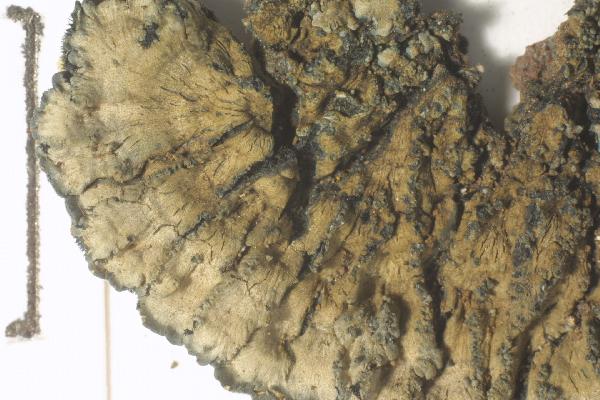

Felix Schumm - CC BY-SA 4.0
[2471], Spanien, Kanarische Inseln, Teneriffa, Mercedeswald bei Cruz
del Carman, Erica-Myrica-Wald, an Lava, 750 m. Leg. F. Schumm,
21.03.1978, det. F. Schumm 1978 - Verglichen mit Proben aus dem
Herbar G.Follmann.
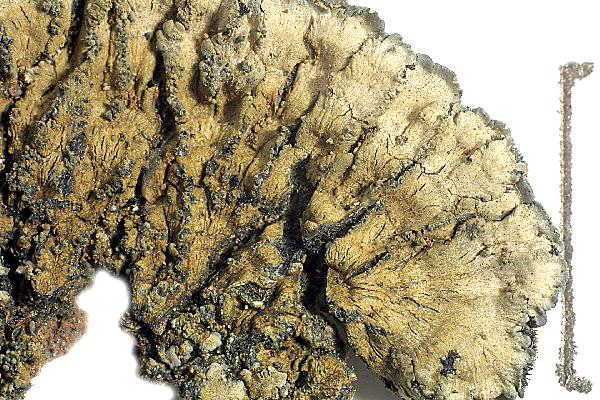

Felix Schumm - CC BY-SA 4.0
[2471], Spanien, Kanarische Inseln, Teneriffa, Mercedeswald bei Cruz
del Carman, Erica-Myrica-Wald, an Lava, 750 m. Leg. F. Schumm,
21.03.1978, det. F. Schumm 1978 - Verglichen mit Proben aus dem
Herbar G.Follmann.
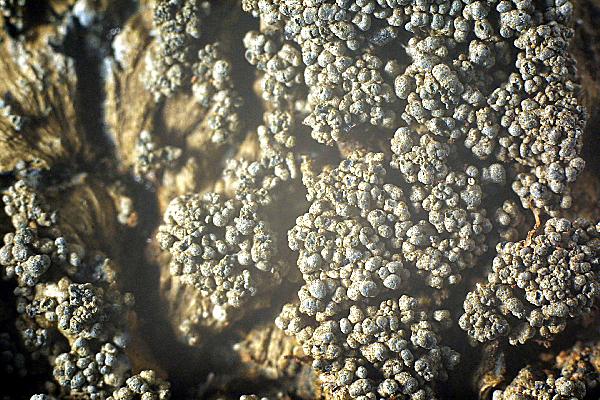

Felix Schumm - CC BY-SA 4.0
[2471], Spanien, Kanarische Inseln, Teneriffa, Mercedeswald bei Cruz
del Carman, Erica-Myrica-Wald, an Lava, 750 m. Leg. F. Schumm,
21.03.1978, det. F. Schumm 1978 - Verglichen mit Proben aus dem
Herbar G.Follmann.
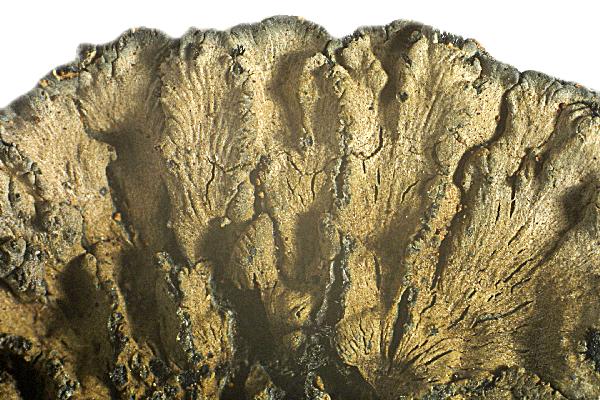

Felix Schumm - CC BY-SA 4.0
[2471], Spanien, Kanarische Inseln, Teneriffa, Mercedeswald bei Cruz
del Carman, Erica-Myrica-Wald, an Lava, 750 m. Leg. F. Schumm,
21.03.1978, det. F. Schumm 1978 - Verglichen mit Proben aus dem
Herbar G.Follmann.
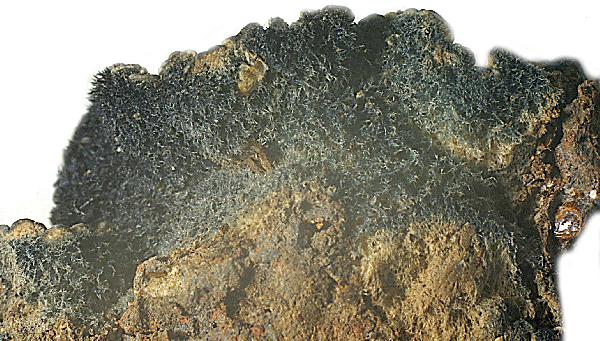

Felix Schumm - CC BY-SA 4.0
[2471], Spanien, Kanarische Inseln, Teneriffa, Mercedeswald bei Cruz
del Carman, Erica-Myrica-Wald, an Lava, 750 m. Leg. F. Schumm,
21.03.1978, det. F. Schumm 1978 - Verglichen mit Proben aus dem
Herbar G.Follmann.
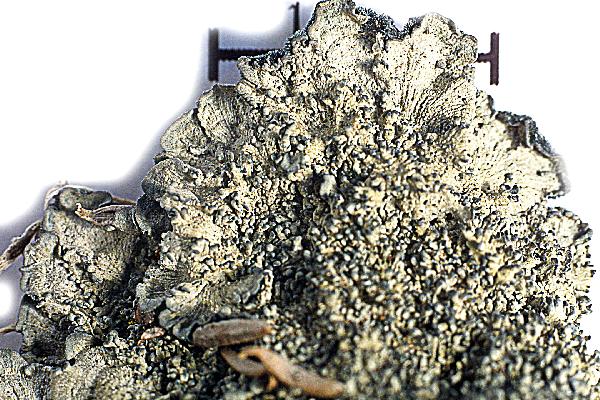

Felix Schumm - CC BY-SA 4.0
[11123], Portugal, Azoren, Sao Miguel: Westküste, Ponta da Ferraira,
an porösen, schwarzen Lavablöcken in Meeresnähe, 37°51.624' N,
25°51.144' W, 0 m. Leg. F. Schumm, 04.06.2003, det. F. Schumm,
09.2003. - P-/-; Markhyphen dicht parallel zur Unterseite, Obere Rinde
ziemlich dünn, eher paraplectenchymatisch
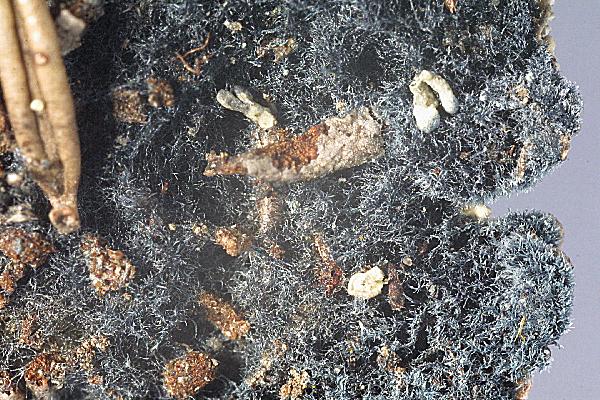

Felix Schumm - CC BY-SA 4.0
[11123], Portugal, Azoren, Sao Miguel: Westküste, Ponta da Ferraira,
an porösen, schwarzen Lavablöcken in Meeresnähe, 37°51.624' N,
25°51.144' W, 0 m. Leg. F. Schumm, 04.06.2003, det. F. Schumm,
09.2003. - P-/-; Markhyphen dicht parallel zur Unterseite, Obere Rinde
ziemlich dünn, eher paraplectenchymatisch
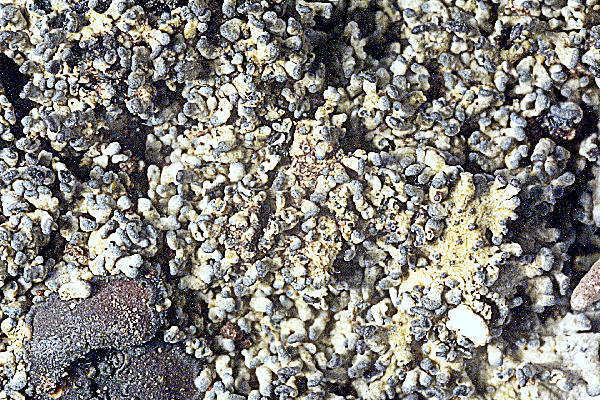

Felix Schumm - CC BY-SA 4.0
[11123], Portugal, Azoren, Sao Miguel: Westküste, Ponta da Ferraira,
an porösen, schwarzen Lavablöcken in Meeresnähe, 37°51.624' N,
25°51.144' W, 0 m. Leg. F. Schumm, 04.06.2003, det. F. Schumm,
09.2003. - P-/-; Markhyphen dicht parallel zur Unterseite, Obere Rinde
ziemlich dünn, eher paraplectenchymatisch
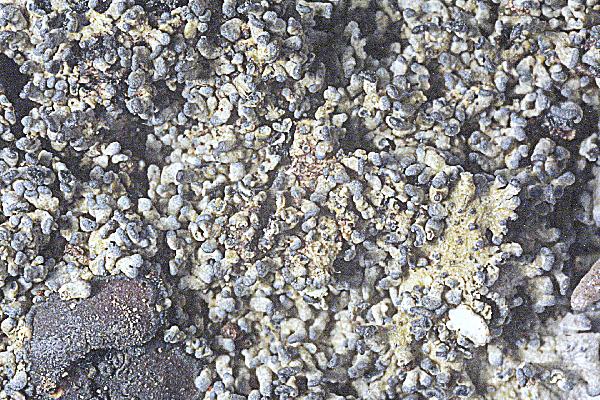

Felix Schumm - CC BY-SA 4.0
[11123], Portugal, Azoren, Sao Miguel: Westküste, Ponta da Ferraira,
an porösen, schwarzen Lavablöcken in Meeresnähe, 37°51.624' N,
25°51.144' W, 0 m. Leg. F. Schumm, 04.06.2003, det. F. Schumm,
09.2003. - P-/-; Markhyphen dicht parallel zur Unterseite, Obere Rinde
ziemlich dünn, eher paraplectenchymatisch
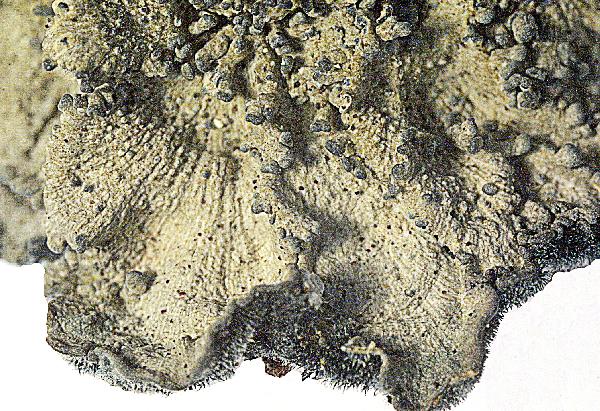

Felix Schumm - CC BY-SA 4.0
[11123], Portugal, Azoren, Sao Miguel: Westküste, Ponta da Ferraira,
an porösen, schwarzen Lavablöcken in Meeresnähe, 37°51.624' N,
25°51.144' W, 0 m. Leg. F. Schumm, 04.06.2003, det. F. Schumm,
09.2003. - P-/-; Markhyphen dicht parallel zur Unterseite, Obere Rinde
ziemlich dünn, eher paraplectenchymatisch
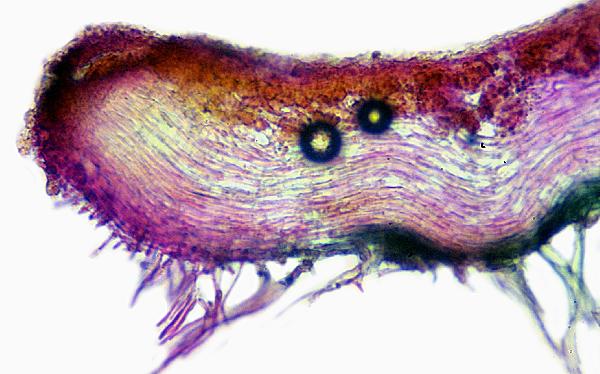

Felix Schumm - CC BY-SA 4.0
[11123], Portugal, Azoren, Sao Miguel: Westküste, Ponta da Ferraira,
an porösen, schwarzen Lavablöcken in Meeresnähe, 37°51.624' N,
25°51.144' W, 0 m. Leg. F. Schumm, 04.06.2003, det. F. Schumm,
09.2003. - P-/-; Markhyphen dicht parallel zur Unterseite, Obere Rinde
ziemlich dünn, eher paraplectenchymatisch
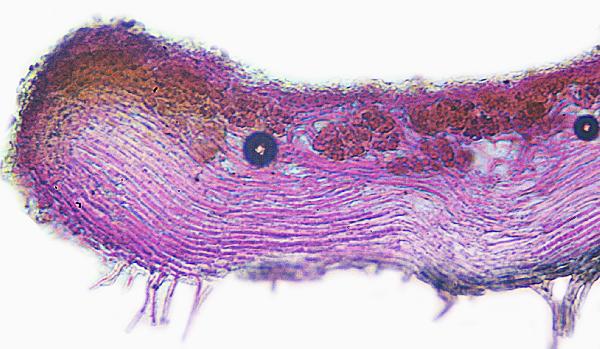

Felix Schumm - CC BY-SA 4.0
[11123], Portugal, Azoren, Sao Miguel: Westküste, Ponta da Ferraira,
an porösen, schwarzen Lavablöcken in Meeresnähe, 37°51.624' N,
25°51.144' W, 0 m. Leg. F. Schumm, 04.06.2003, det. F. Schumm,
09.2003. - P-/-; Markhyphen dicht parallel zur Unterseite, Obere Rinde
ziemlich dünn, eher paraplectenchymatisch
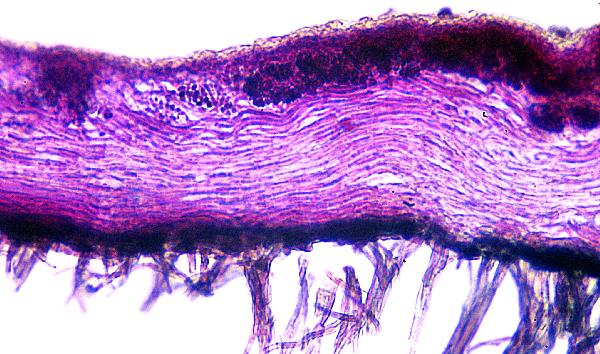

Felix Schumm - CC BY-SA 4.0
[11123], Portugal, Azoren, Sao Miguel: Westküste, Ponta da Ferraira,
an porösen, schwarzen Lavablöcken in Meeresnähe, 37°51.624' N,
25°51.144' W, 0 m. Leg. F. Schumm, 04.06.2003, det. F. Schumm,
09.2003. - P-/-; Markhyphen dicht parallel zur Unterseite, Obere Rinde
ziemlich dünn, eher paraplectenchymatisch
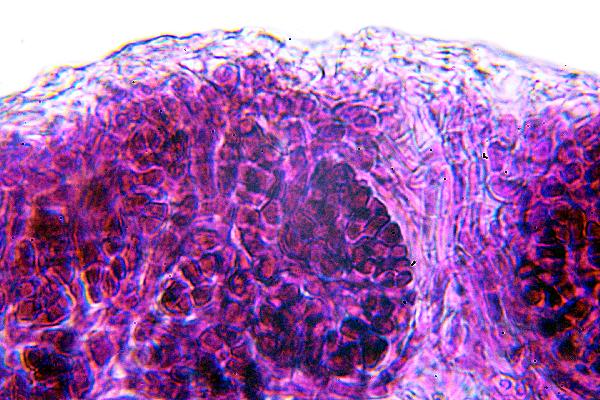

Felix Schumm - CC BY-SA 4.0
[11123], Portugal, Azoren, Sao Miguel: Westküste, Ponta da Ferraira,
an porösen, schwarzen Lavablöcken in Meeresnähe, 37°51.624' N,
25°51.144' W, 0 m. Leg. F. Schumm, 04.06.2003, det. F. Schumm,
09.2003. - P-/-; Markhyphen dicht parallel zur Unterseite, Obere Rinde
ziemlich dünn, eher paraplectenchymatisch
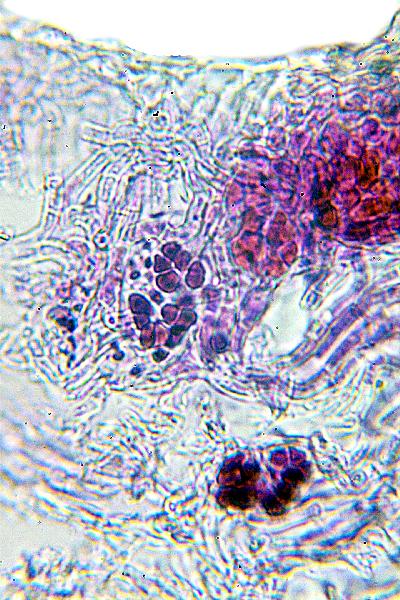

Felix Schumm - CC BY-SA 4.0
[11123], Portugal, Azoren, Sao Miguel: Westküste, Ponta da Ferraira,
an porösen, schwarzen Lavablöcken in Meeresnähe, 37°51.624' N,
25°51.144' W, 0 m. Leg. F. Schumm, 04.06.2003, det. F. Schumm,
09.2003. - P-/-; Markhyphen dicht parallel zur Unterseite, Obere Rinde
ziemlich dünn, eher paraplectenchymatisch
Growth form: Foliose, narrow lobed
Substrata: bark
Photobiont: cyanobacteria, filamentous (e.g. Nostoc, Scytonema)
Reproductive strategy: mainly asexual, by isidia, or isidia-like structures (e.g. schizidia)
Restricted to humid-warm, oceanic areas
Poorly known taxon in need of further study
Commonnes-rarity: (info)
Alpine belt: absent
Subalpine belt: absent
Oromediterranean belt: absent
Montane belt: extremely rare
Submediterranean belt: absent
Padanian area: absent
Humid submediterranean belt: extremely rare
Humid mediterranean belt: extremely rare
Dry mediterranean belt: absent

Predictive model
| Herbarium samples |

Jacques Haines - Source: http://www.lichensmaritimes.org/index.php?task=fiche&lichen=403&lang=en
Spain, Canary Islands, Santa Cruz de Tenerife

Jacques Haines - Source: http://www.lichensmaritimes.org/index.php?task=fiche&lichen=403&lang=en
Spain, Canary Islands, Santa Cruz de Tenerife

Jacques Haines - Source: http://www.lichensmaritimes.org/index.php?task=fiche&lichen=403&lang=en
Spain, Canary Islands, Santa Cruz de Tenerife

Jacques Haines - Source: http://www.lichensmaritimes.org/index.php?task=fiche&lichen=403&lang=en
Spain, Canary Islands, Santa Cruz de Tenerife

Jacques Haines - Source: http://www.lichensmaritimes.org/index.php?task=fiche&lichen=403&lang=en
Spain, Canary Islands, Santa Cruz de Tenerife

Jacques Haines - Source: http://www.lichensmaritimes.org/index.php?task=fiche&lichen=403&lang=en
Spain, Canary Islands, Santa Cruz de Tenerife

Jacques Haines - Source: http://www.lichensmaritimes.org/index.php?task=fiche&lichen=403&lang=en
Spain, Canary Islands, Santa Cruz de Tenerife


Felix Schumm - CC BY-SA 4.0
[2471], Spanien, Kanarische Inseln, Teneriffa, Mercedeswald bei Cruz del Carman, Erica-Myrica-Wald, an Lava, 750 m. Leg. F. Schumm, 21.03.1978, det. F. Schumm 1978 - Verglichen mit Proben aus dem Herbar G.Follmann.


Felix Schumm - CC BY-SA 4.0
[2471], Spanien, Kanarische Inseln, Teneriffa, Mercedeswald bei Cruz del Carman, Erica-Myrica-Wald, an Lava, 750 m. Leg. F. Schumm, 21.03.1978, det. F. Schumm 1978 - Verglichen mit Proben aus dem Herbar G.Follmann.


Felix Schumm - CC BY-SA 4.0
[2471], Spanien, Kanarische Inseln, Teneriffa, Mercedeswald bei Cruz del Carman, Erica-Myrica-Wald, an Lava, 750 m. Leg. F. Schumm, 21.03.1978, det. F. Schumm 1978 - Verglichen mit Proben aus dem Herbar G.Follmann.


Felix Schumm - CC BY-SA 4.0
[2471], Spanien, Kanarische Inseln, Teneriffa, Mercedeswald bei Cruz del Carman, Erica-Myrica-Wald, an Lava, 750 m. Leg. F. Schumm, 21.03.1978, det. F. Schumm 1978 - Verglichen mit Proben aus dem Herbar G.Follmann.


Felix Schumm - CC BY-SA 4.0
[2471], Spanien, Kanarische Inseln, Teneriffa, Mercedeswald bei Cruz del Carman, Erica-Myrica-Wald, an Lava, 750 m. Leg. F. Schumm, 21.03.1978, det. F. Schumm 1978 - Verglichen mit Proben aus dem Herbar G.Follmann.


Felix Schumm - CC BY-SA 4.0
[2471], Spanien, Kanarische Inseln, Teneriffa, Mercedeswald bei Cruz del Carman, Erica-Myrica-Wald, an Lava, 750 m. Leg. F. Schumm, 21.03.1978, det. F. Schumm 1978 - Verglichen mit Proben aus dem Herbar G.Follmann.


Felix Schumm - CC BY-SA 4.0
[2471], Spanien, Kanarische Inseln, Teneriffa, Mercedeswald bei Cruz del Carman, Erica-Myrica-Wald, an Lava, 750 m. Leg. F. Schumm, 21.03.1978, det. F. Schumm 1978 - Verglichen mit Proben aus dem Herbar G.Follmann.


Felix Schumm - CC BY-SA 4.0
[11123], Portugal, Azoren, Sao Miguel: Westküste, Ponta da Ferraira, an porösen, schwarzen Lavablöcken in Meeresnähe, 37°51.624' N, 25°51.144' W, 0 m. Leg. F. Schumm, 04.06.2003, det. F. Schumm, 09.2003. - P-/-; Markhyphen dicht parallel zur Unterseite, Obere Rinde ziemlich dünn, eher paraplectenchymatisch


Felix Schumm - CC BY-SA 4.0
[11123], Portugal, Azoren, Sao Miguel: Westküste, Ponta da Ferraira, an porösen, schwarzen Lavablöcken in Meeresnähe, 37°51.624' N, 25°51.144' W, 0 m. Leg. F. Schumm, 04.06.2003, det. F. Schumm, 09.2003. - P-/-; Markhyphen dicht parallel zur Unterseite, Obere Rinde ziemlich dünn, eher paraplectenchymatisch


Felix Schumm - CC BY-SA 4.0
[11123], Portugal, Azoren, Sao Miguel: Westküste, Ponta da Ferraira, an porösen, schwarzen Lavablöcken in Meeresnähe, 37°51.624' N, 25°51.144' W, 0 m. Leg. F. Schumm, 04.06.2003, det. F. Schumm, 09.2003. - P-/-; Markhyphen dicht parallel zur Unterseite, Obere Rinde ziemlich dünn, eher paraplectenchymatisch


Felix Schumm - CC BY-SA 4.0
[11123], Portugal, Azoren, Sao Miguel: Westküste, Ponta da Ferraira, an porösen, schwarzen Lavablöcken in Meeresnähe, 37°51.624' N, 25°51.144' W, 0 m. Leg. F. Schumm, 04.06.2003, det. F. Schumm, 09.2003. - P-/-; Markhyphen dicht parallel zur Unterseite, Obere Rinde ziemlich dünn, eher paraplectenchymatisch


Felix Schumm - CC BY-SA 4.0
[11123], Portugal, Azoren, Sao Miguel: Westküste, Ponta da Ferraira, an porösen, schwarzen Lavablöcken in Meeresnähe, 37°51.624' N, 25°51.144' W, 0 m. Leg. F. Schumm, 04.06.2003, det. F. Schumm, 09.2003. - P-/-; Markhyphen dicht parallel zur Unterseite, Obere Rinde ziemlich dünn, eher paraplectenchymatisch


Felix Schumm - CC BY-SA 4.0
[11123], Portugal, Azoren, Sao Miguel: Westküste, Ponta da Ferraira, an porösen, schwarzen Lavablöcken in Meeresnähe, 37°51.624' N, 25°51.144' W, 0 m. Leg. F. Schumm, 04.06.2003, det. F. Schumm, 09.2003. - P-/-; Markhyphen dicht parallel zur Unterseite, Obere Rinde ziemlich dünn, eher paraplectenchymatisch


Felix Schumm - CC BY-SA 4.0
[11123], Portugal, Azoren, Sao Miguel: Westküste, Ponta da Ferraira, an porösen, schwarzen Lavablöcken in Meeresnähe, 37°51.624' N, 25°51.144' W, 0 m. Leg. F. Schumm, 04.06.2003, det. F. Schumm, 09.2003. - P-/-; Markhyphen dicht parallel zur Unterseite, Obere Rinde ziemlich dünn, eher paraplectenchymatisch


Felix Schumm - CC BY-SA 4.0
[11123], Portugal, Azoren, Sao Miguel: Westküste, Ponta da Ferraira, an porösen, schwarzen Lavablöcken in Meeresnähe, 37°51.624' N, 25°51.144' W, 0 m. Leg. F. Schumm, 04.06.2003, det. F. Schumm, 09.2003. - P-/-; Markhyphen dicht parallel zur Unterseite, Obere Rinde ziemlich dünn, eher paraplectenchymatisch


Felix Schumm - CC BY-SA 4.0
[11123], Portugal, Azoren, Sao Miguel: Westküste, Ponta da Ferraira, an porösen, schwarzen Lavablöcken in Meeresnähe, 37°51.624' N, 25°51.144' W, 0 m. Leg. F. Schumm, 04.06.2003, det. F. Schumm, 09.2003. - P-/-; Markhyphen dicht parallel zur Unterseite, Obere Rinde ziemlich dünn, eher paraplectenchymatisch


 INDEX FUNGORUM
INDEX FUNGORUM
 GBIF
GBIF
